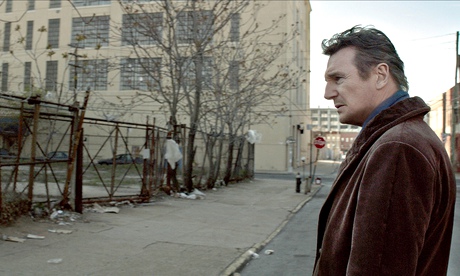A WALK AMONG THE TOMBSTONES (directed by Scott Frank, 2014)
In the first five minutes of "A Walk Among The Tombstones," Liam Neeson hurls a choice racial epithet, orders a shot of whiskey with his coffee, orders a second shot, adjusts his coat to reveal a gun, then as the pièce de résistance, whips out a badge. A few thugs rob the bar he's occupying, killing the owner, and, paying this victim barely a moment's notice, he follows them outside and shoots each with the blatant attempt to kill. With that, we have met our protagonist, Matthew Scudder. This is not a movie that is shy about the details.
Good thing, too, because it's in the details that this movie thrives. Much has been ballyhooed regarding Neeson's improbable late career reinvention as an action star, but that only tells half the story. No one's asking him to star in "Transformers 5: Beyond The Shadow Of The Moon's Extinction Or Whatever." Neeson isn't just the king of mature action movies. He's the king of January or September mature action movies - those wondrous two months when people don't see movies because they're good so much as because they're there.
Lowered expectations can work in one's favor, though; there's a reason people seem to like me on OkCupid. Plop down "Tombstones" in Oscar season or the height of summer, and it's dead on arrival. Key to the movie's success is that it knows what it does well, and with one minor exception to be addressed later, it knows what it doesn't do well. There's something to be said for a competent adult story, told competently, for competent adults.
Here is a movie that moves with the leisurely pace that only comes with being sure of oneself.
Adapted from a series of novels by Lawrence Block, the plot is classic potboiler. Scudder harbors a dark, alcohol soaked past. He works as a private (albeit unlicensed) investigator; as he discreetly says, he does favors for people who show gratitude in return. A new client, who he knows better to take on, brings a story of woe and a murdered wife, plummeting Scudder into a dark, seedy underworld bigger than he anticipated. Loads of wide shots of Neeson walking in front of dirty brick walls.
As said, "Tombstones" lives in the fringes. Characters drift in and out of his life and the plot. Scudder befriends a homeless black teenager in a recurring bit that feels lifted from "What's Happening!!" instead of "The Maltese Falcon." Instead of derailing the movie, though, it's a humorous aside that writer/director Scott Frank discards and returns to at will. On the other hand, we have a scene on a rooftop between Neeson and a splendid actor named Ólafur Darri Ólafsson, playing a cemetery groundskeeper, that's so well-written and performed, it's almost chilling.
Such is the expert juggling act of "Tombstones." Rarely blatantly humorous, but not unrelentingly bleak either. It has just enough self-awareness to recognize the film noir tropes it's playing with, but at the same time, it genuinely enjoys playing with them. Thoroughly well-crafted pulp.
Perhaps it's fate (or more likely coincidence) that "Tombstones" arrives in theaters the same month as "The Equalizer" with Denzel Washington. Both movies center on sullen, detached older men who are all too skilled in killing. Both movies feature shocking outbursts of violence. But whereas "The Equalizer" postures as an adult thriller until eventually crumbling into its true, immature self, "Tombstones" is surer and more methodical in its approach.
Frank doesn't relish in portraying violence, and in fact, he seems practically unwilling to do so, saving it for when it counts. Neeson's Scudder is instead a man who would much rather avoid hurting people - he simply wants to learn the story and doesn't much like being lied to. Frank's intent isn't that of a horny teenage boy who wants to see the blood splatter. He's far more interested in the effect, the consequences. What does it mean when someone is killed, and what happens next? When people actually do die in "Tombstones," then, it stings.
Everything about "Tombstones," in fact, is measured and assured. Frank doesn't hurtle the movie forward like a train, but it's never boring either. He occupies the screen with fascinating moment after moment, rarely cutting too much within a scene and allowing these moments to linger. One key scene, for instance, in a basement features one character walking down the stairs with another character waiting to pounce. A lesser filmmaker would lean on edits, alternating between closeups of the one clueless person and the other hiding in the shadows, maybe earning a cheap jolt when the latter finally makes his move. Instead, Scott shoots this set-up through a single stationary shot, never forcing the confrontation, allowing us to get a feel for where everyone is and what's about to happen before the strike.
This is a movie that, by and large, knows what it's doing, which makes it all the more frustrating when it falters slightly. Although Block's novel takes place in 1992 New York, Scott updates it to 1999. Apart from the easy Y2K jokes (Remember that? Because the movie sure does!), why does Scott make this move? If it wasn't clear before, the final shot, with a sudden appearance of the Twin Towers that recalls Spielberg's "Munich," drives it home in a way that feels rather forced and unearned.
As one character comments, people are afraid of the wrong things. But in trying to connect this seedy, violent world with the post 9/11 society of today, "Tombstones" bites off a bit more than it can chew.
Still, this is an exceedingly well-constructed piece of work, granting Neeson his best role since "The Grey." We all want movies to be great. Can't we also be happy when they simply make theaters in September livable?

No comments:
Post a Comment